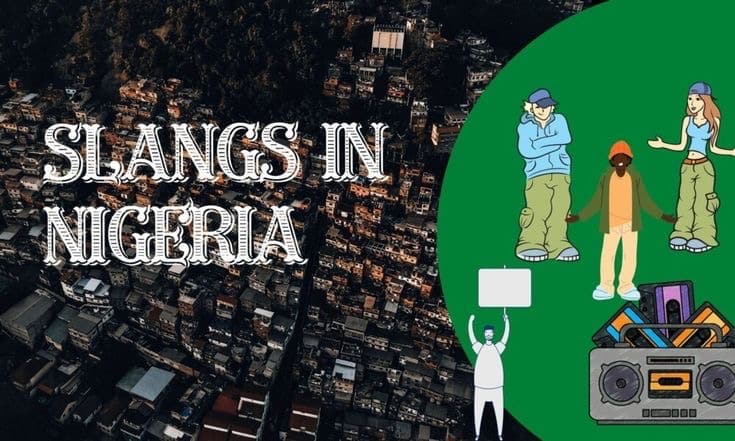Nigeria is a country bubbling with energy, and its language reflects that perfectly. English might be the official language, but Nigerians have made up a cool collection of slang words and sayings they use all the time. This special slang is called Nigerian Pidgin. This slang is like a secret code that brings people together, cracks you up, and leaves outsiders scratching their heads.
Let’s explore this world of funny Nigerian slangs, understand their origins, and how to use them like a true Naija (Nigerian) pro. We’ll build our Nigerian slang dictionary, one hilarious term at a time!
Table of Contents
18 Funny Nigerian Slang and Their Origins
-
Wahala dey (There is trouble)
This one is a classic. Imagine your friend calls you up, panting. “Guy, wahala, wahala dey oh!” That translates to “Serious trouble is brewing!” This word comes from the Hausa language, and depending on the tone, it can range from mild annoyance to full-blown chaos.
-
E choke (It chokes)
This doesn’t mean someone is choking. It means something is extremely funny, so funny it’s hard to breathe! E choke can come from a hilarious joke, a crazy situation, or even someone’s dance moves. It all depends on the context.
Origin story: Imagine someone telling a joke so side-splittingly funny that you laugh so hard you choke on your laughter. Now that’s the e-choke material!
-
Yawa gas (Empty talk)
Ever heard someone blowing smoke? In Nigeria, we call it yawa gas. This refers to someone talking nonsense, bragging, or spreading rumors. It’s basically hot air with no substance.
Origin story: Think of a deflated balloon – all those big promises and stories with nothing to back them up. That’s the essence of yawa gas!
-
You dey play me? (Are You Playing Me?)
This isn’t a literal question (most of the time!). It’s an expression of disbelief, annoyance, or even playful teasing. Imagine your friend telling you they won the lottery. “You dey play me?” is a way of saying, “Seriously? Don’t joke around!”
Origin story: It comes from the idea of someone messing with you, like playing a prank. But beware, the tone can change depending on the situation!
-
Shakara no be work (Pride isn’t work)
Shakara is all about putting on airs, acting prideful, or being unnecessarily difficult. This saying reminds us that being humble and getting things done is more important than a fancy show.
Origin story: Shakara might come from a Yoruba word meaning “deceit” or “display.” This saying cuts through the act and reminds us to focus on what truly matters.
Read also: Nigerian Slangs Dictionary.
-
Pepper them (Annoy them)
Imagine metaphorically throwing pepper in someone’s eyes. This sassy phrase means to annoy someone, especially by showing off or bragging subtly.
Origin story: Just like a pepper makes your eyes water, “peppering” someone is a way to get a reaction but in a more subtle, teasing way.
-
On point (excellent)
This one has crossed borders and become widely used, but Nigerians love it! On point means something is excellent, perfect, or exactly as it should be.
Origin story: It probably comes from the idea of everything being “in the right place” or perfectly aligned, like a dancer hitting all the moves.
-
No be lie (It’s true)
This is a strong way of agreeing with something. It’s more emphatic than a simple “yes” and conveys that you believe what’s being said.
Origin story: It’s a straightforward one! “No be lie” literally translates to “it is not a lie,” emphasizing that something is absolutely true.
Read also 20+ Funny Nigerian Memes That Never Stop Being Funny.
-
Forget that thing (It doesn’t matter)
This isn’t about forgetting something completely. It’s a way of dismissing something as unimportant or not worth worrying about.
Origin story: Imagine something so trivial that it’s not even worth mentioning anymore. That’s the idea behind “forget that thing.”
-
Bale (Lie)
This short and sweet word exposes a lie. It simply means something is false and can be used playfully or seriously.
Origin story: The exact origin is unclear, but it might be a shortened form of “to fabricate” or “to tell a tale.”
-
Wetin dey happen (What’s happening?)
This is your all-purpose greeting on the streets of Nigeria. It’s a casual way to ask someone, “What’s going on?” or “How are you?”
Origin story: “Wetin” is a Pidgin English way of saying “what thing,” and “dey happen” means “is happening.” So, it translates to “What thing is happening?”
-
E be like say (It seems like)
This phrase is used to express uncertainty or guess something. It’s like saying “I think” or “it seems that…”
Origin story: “E be like say” combines English and Pidgin English. “E be like” means “it is like” in Pidgin English, and “say” is added from English to introduce the following statement.
Join our Whatsapp community to take part in our fun-filled and insightful conversations.
-
Amen corner (Place of agreement)
This isn’t a physical location! It refers to a group of people who wholeheartedly agree with something. Imagine a church congregation saying “amen” – the kind of enthusiastic agreement you’d find in the amen corner.
Origin story: The connection comes from a church where people say “amen” in agreement with prayers. In Nigerian slang, it’s used for any situation with strong agreement.
-
Chopping money (Making money)
This isn’t about literally chopping food! It’s a fun way to say someone is making money, especially a good amount.
Origin story: Imagine “chopping” being a metaphor for actively acquiring something, in this case, money. It adds a sense of energy and enthusiasm to making money.
-
I dey hail (I greet you)
This is a friendly greeting used especially in informal settings. It’s a way of acknowledging someone and showing respect.
Origin story: “Dey” is from Pidgin English and means “am” or “are.” So, “I dey hail” literally translates to “I am greeting you.”
-
O.Y.O (On your own)
O.Y.O is a short but powerful message. It means you’re leaving someone to deal with a situation on their own, with a hint of “good luck!”
Origin story: The exact origin is debated, but some theories suggest it comes from a Yoruba phrase meaning “it’s left for you.”
-
Na so (That’s how it is)
“Na so” is a versatile phrase. It can mean “that’s how it is” (accepting a situation), “of course” (agreeing to something), or even “I told you so” (with a knowing nod).
Origin story: “Na” comes from Yoruba and Igbo languages and means “it is” or “they are.” So, “na so” literally translates to “it is so” or “that’s how it is.”
-
Oya now! (Let’s go now!)
This high-energy phrase is your go-to when you want to get things moving. It’s a call to action, an enthusiastic nudge to get going, like “Let’s do this!”
Origin story: Oya is a Yoruba word for “come” or “let’s go.” Adding “Now Now” emphasizes the urgency and excitement to get started.
Conclusion
These are just a few entries in our ever-growing Nigerian slang dictionary. The best way to learn more is to jump right in and start listening to Nigerian music, watching Nollywood movies, or chatting with Nigerians themselves.
You’ll be a certified “Nigerian Slangsman” in no time – just watch out for all the wahala that might come your way (hopefully the good kind of wahala, with laughter).
Subscribe to our newsletter to receive notifications of our latest posts on Nigerian Lifestyle, Business, Technology, Spice, etc.
Edited by Oluwanifemi Akintomide.
About Author
-
Winnie Sunday is a versatile writer and certified relationship counselor with a background in SLT from Federal Polytechnic Nasarawa, Nigeria.
With a passion for words, she artfully weaves stories that resonate with readers. When not penning her thoughts, she finds solace in music and the pages of a good book.
Latest entries


 CareerFebruary 16, 2024Do You Need a Culinary School to Build a Career as a Chef?
CareerFebruary 16, 2024Do You Need a Culinary School to Build a Career as a Chef? LifestyleDecember 3, 2023What is a Foot Fetish? How Does it Influence a Relationship?
LifestyleDecember 3, 2023What is a Foot Fetish? How Does it Influence a Relationship?

